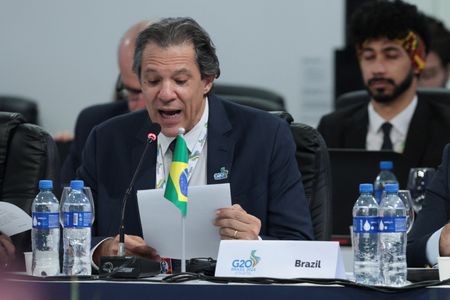 1
1 1
1
By Marcela Ayres
WASHINGTON (Reuters) -G20 finance ministers and central bank governors are adjusting to expectations for a later start to U.S. interest rate cuts, which has caused a worldwide asset repricing and increased the urgency for debates on debt, Brazil’s finance leaders said on Thursday.
Finance Minister Fernando Haddad told a press conference after a Group of 20 finance leaders meeting in Washington that the shift in expectations following higher-than-expected March inflation readings in the U.S. has subdued sentiment about various economic variables, including a global repricing of assets.
Haddad also noted that the U.S. central bank’s communication has not been cohesive, following widespread expectations that rate cuts in the world’s largest economy would begin in the first half of this year.
“When the March (inflation data) scare came, there was a drastic reversal of expectations, and this changed the mood significantly regarding how economic variables will behave worldwide,” he said.
“Everything else depends somewhat on this.”
Speaking at the same news conference, which took place during the spring meetings of the International Monetary Fund and World Bank, Brazilian central bank chief Roberto Campos Neto said the scenario has led to the strengthening of the U.S. dollar, which is “always a problem” that can provoke reactions from policymakers.
Nevertheless, he noted that Brazil’s debt is less affected by this development than other countries, and Brazil’s central bank only intervenes in the foreign exchange market in case of malfunctioning.
Campos Neto said it was necessary to wait and be cautious in the face of expectations that the Fed could keep U.S. interest rates at a high level for a longer period.
“Depending on the path (that unfolds), we will have a reaction function, I cannot anticipate what will happen,” he said, when asked if he had abandoned the forward guidance previously given of another 50-basis-point interest rate cut at the Brazilian central bank’s next policy meeting in May.
Haddad also noted that many G20 countries have dollar-denominated debt that is affected by changes in U.S. interest rates, which increases the urgency of discussions for potential restructuring and assistance to nations.
“All of this will need to be done with greater speed, greater agility, and perhaps new sources of funding,” he said. “There have been discussions about new contributions to countries, especially for concessional loans … at a time when interest rates make debt servicing unaffordable.”
(Reporting by David Lawder; Editing by Chris Reese and Paul Simao)